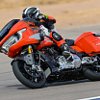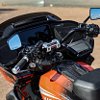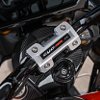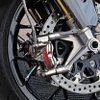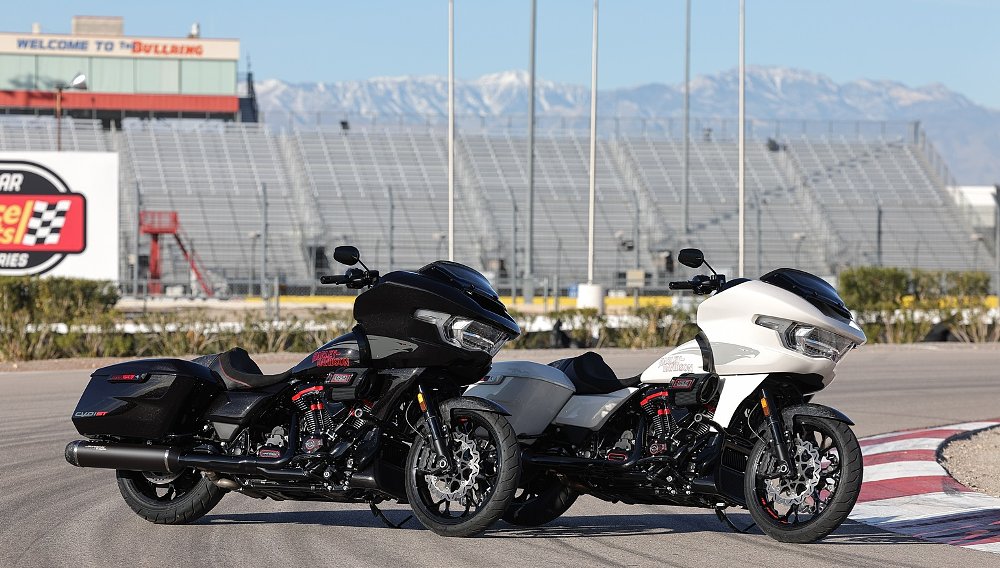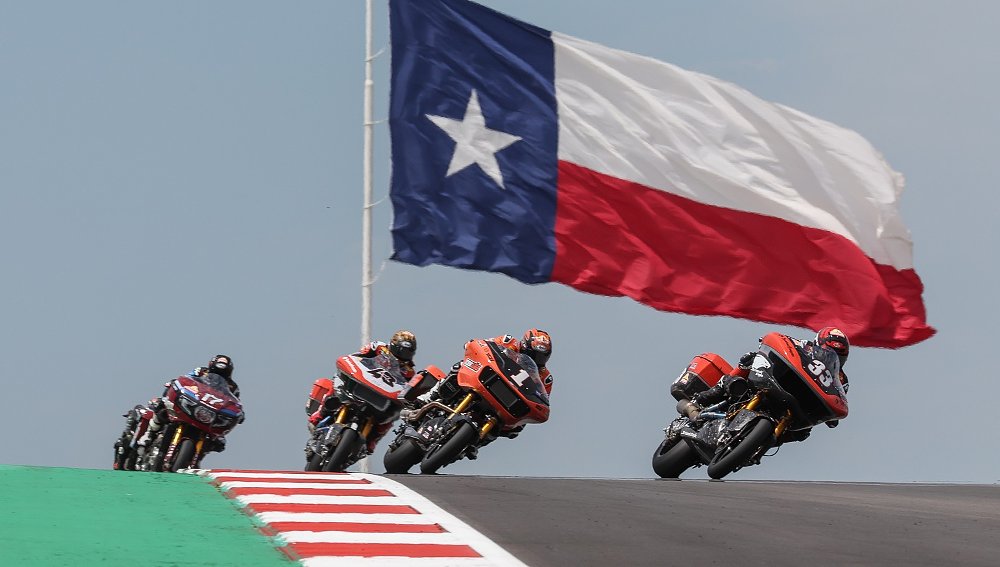Harley-Davidson’s CVOs are built to exemplify superlatives. Most exclusive, biggest, best, most powerful. That means each subsequent CVO aims to up the ante on the previous version, and considering the 2024 CVO Road Glide ST is a $43,000, 121 ci factory custom, kicking it up a notch for 2025 was going to be a challenge.
Luckily, Harley-Davidson’s Factory Race Team and its MotoAmerica Mission King of the Baggers race bike are a reservoir of inspiration. By applying hardware and features from the championship-winning machine, the 2025 CVO Road Glide RR performance bagger has more muscle (131 ci and 155 horsepower), more technology (race-derived transmission and billet clutch basket), more performance (Superbike-spec Öhlins and Brembo all around), and yes, more cost ($110,000!), than ever before. This is the CVO status quo on steroids.
Best of the best
An evolution of the CVO Road Glide ST that Lance rode last year, this new bagger takes everything to the next level in pursuit of corner-carving performance. Rather than a 121 ci engine, the race-replica RR utilizes an upgraded 131 ci (2,147 cc) Milwaukee-Eight monster from the Screamin’ Eagle performance catalog. The result is a claimed 155 horsepower at 5,750 rpm and 150 foot-pounds of torque at 4,750, plus a higher 6,500 rpm redline (up from 5,900) for more overrev.

Power is pushed through a billet-aluminum clutch basket and King 6 transmission, components originally developed by the race team. Slowing the whoa are the same Brembo T-Drive rotors and nickel-plated Brembo GP4-RX calipers that Kyle Wyman and teammate James Rispoli squeeze at speed.
If you haven’t watched a KotB race, it’s a thrilling spectacle to see such huge bikes maneuver through corners with so much velocity and, dare I say, grace. H-D knew the Road Glide RR needed some of that athleticism, so they installed the same Öhlins FGR fork used by the Factory Race Team and slapped a set of fully adjustable Öhlins shocks out back. The shocks are bolted to a sculpture of a swingarm that’s hewn from a solid block of billet aluminum, just like on the race bike. More than 12 hours of machining whittle a 220-pound block down to an 18-pound assembly that’s 10% lighter and 10% stiffer than the ST’s steel swingarm.

The real-deal KotB bike that Zack rode in 2022 is lifted like a bro truck to provide necessary cornering clearance for race pace. A 36-inch seat height wouldn’t fly (no pun intended) on a street bike, so Harley settled on a two-inch increase in ride height to help the RR carry a little (three degrees) more lean. A custom solo seat rests 29.2 inches above the ground, one inch higher than on the ST.
Shaving weight off a bike as big-boned as a Road Glide isn’t easy, but it was a mandate for the RR. The fairing, fenders, side covers, seat pan, radiator surround, and saddlebags are all made from carbon fiber to save mass, while the engine covers are machined from billet rather than cast. The titanium Akrapovič pipe alone drops 10 pounds and is 50-state legal, though H-D reps acknowledge its dB output is “within a few tenths" of the noise limit. In the end, the Race Team’s scalpel cut 50 pounds off the RR, bringing its curb weight to a claimed 785 pounds.

The CVO Road Glide is the most powerful bike Harley has ever built, and Race Team director Jason Kehl says that the chassis offers so much control that Harley has raised its rating scale as a result.
The only thing left to do was see how all those superlatives manifest at speed.
CVO at speed
The last time (maybe the only time?) I’ve had a Harley on a circuit was at a police rodeo in Texas. That cone course was decidedly different from the fast-and-flowing 2.3-mile, 15-turn Podium Club track in Arizona where Harley-Davidson brought us to experience a pre-production CVO Road Glide RR.
Climbing on the RR feels a bit different from most Glides. The seat is firmer if not farther forward, and there’s an upholstered “pommel” on the back of the tank that serves as an anchor point for your knees. Footpegs supplant the mini floorboards found on the ST, and risers put the bar at a little lower than shoulder height for good leverage. It may be considered an aggressive layout by bagger standards, but the RR is still a relaxed-feeling machine. Until you fire up the engine.

The two-into-one Akro exhaust is appropriately baritone given the half-gallon of displacement it's plumbing, and given the fist-sized pistons, the engine sure revs up quickly. Rolling on track behind Kyle Wyman for some sighting laps, I was excited to twist the throttle open and see what 131 ci feels like. The RR gallops forward and easily hit its 120-mph (governed, for the sake of the tires) top speed on the front straight every lap, but it’s still a heavy bike, so the outright acceleration is unlikely to take your breath away.
Mass may inhibit how quickly the RR gets off a corner, but it doesn’t seem to affect how well it gets through a corner. That’s thanks to the upgraded suspension. The CVO handles remarkably well and changes direction far quicker and easier than expected. On the brakes or on the gas, it’s a rock-solid platform while leaned over — as long as the track is smooth. There were bumps in a few corners that set the rear end dancing, but it would regain composure after a few bounces. In later sessions when my speed came up I opted to stand on the pegs and moto over the bumps as a way to assist the shocks, which seemed to get a little loose as the damping oil got hot after the third or fourth lap.

The fork on the other hand can’t be fazed, at least by someone of my skill level. As you’d expect from a race-catalog component, there’s exceptional support, which is good because the Brembo brakes are ridiculous. The CVO sheds speed incredibly well, and I was constantly pushing my braking later and shoving on the bar harder to turn in quicker. Equally impressive? The fact that the standard-issue Dunlops, which typically last 10,000 miles on the street, were up to the task of ripping around the race track at a 7/10s pace. Sure, the rear got greasy after a few laps, but with 64 inches of stability between contact patches the resultant power slides were thrilling, not frightening.
Ultimately, the thing that reined in my fun was a lack of cornering clearance. Even with the added ride height you bury the pegs fairly quickly, followed a few degrees later by immovable hard parts. I also had some issues with the engine cutting out midway through my sessions, but it turns out that’s an engine-safety feature that’s based on time spent above a certain RPM. Harley said that will be adjusted on the production version of the RR.

Once I’d found the bike’s limit (with me on it, surely the factory riders would have squeezed many more seconds out of the RR), I shifted my focus to experimenting with some of the Harley’s many features. It’s got adjustable linked brakes and various ride modes with adjustable throttle maps, traction control, etc. I actually liked having the ECU add some rear brake when I got on the front as it improved stability, and switching to Sport mode, with its more immediate response, allowed me to run through some corners a gear higher than when I used the Race mode with its gentler pickup.
Who’s got $110,000?!
As my friend and former pro H-D drag racer Gene Thomason pointed out, plenty of people have built big-inch Harleys that are fast in a straight line, but the CVO Road Glide RR is the first production Harley that was built to handle at speed. And the fact is, if the RR was in a lineup at a track day, I’d definitely be excited to take it out for a session.

But is track-day novelty worth $110,000? In all reality, the people who buy this bike won’t take it to the track, just like the people who bought the $500,000 Ford F-150 VelociRaptor are unlikely to do anything with it that they wouldn’t do with a $35,000 Maverick. With vehicles like this, it’s not about capability, it’s about exclusivity, and from the engine size to the trickle-down race parts and bona fide performance, Harley has certainly outdone itself with this latest CVO.
| 2025 CVO Road Glide RR | |
|---|---|
| Price (MSRP) | $110,000 |
| Engine | 131 ci (2,147 cc), air-and-liquid-cooled, eight-valve, V-twin |
|
Transmission, final drive |
Six-speed, belt |
| Claimed horsepower | 155.0 @ 5,750 rpm |
| Claimed torque | 150 foot-pounds @ 4,750 rpm |
| Frame | Steel tubular |
| Front suspension | Öhlins FGR 253 43mm inverted fork with adjustable preload, compression, and rebound damping; 5.1 inches of travel |
| Rear suspension | Öhlins shocks adjustable for preload, compression, and rebound damping; 3.5 inches of travel |
| Front brake | Brembo radial-mount four-piston calipers, 320 mm discs, with ABS |
| Rear brake | H-D four-piston caliper, 300 mm disc, with ABS |
| Rake, trail | 26 degrees, 6.7 inches |
| Wheelbase | 64.4 inches |
| Seat height | 29.2 inches |
| Fuel capacity | 6.0 gallons |
| Tires | Dunlop D408F 130/60B19 front, Dunlop 407T 180/55B18 rear |
| Claimed weight | 785 pounds wet |
| Available | Now |
| Warranty | 24 months |
| More info | harley-davidson.com |





